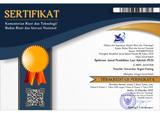Students Self-Regulation: An Analysis of Exploratory Factors of Self-Regulation Scale
 ), Intan Harniati(2), Mesfin Hailemariam(3), Ciptro Handrianto(4),
), Intan Harniati(2), Mesfin Hailemariam(3), Ciptro Handrianto(4), (1) Malikussaleh University
(2) Malikussaleh University
(3) Addis Ababa University
(4) Sultan Idris Education University
 Corresponding Author
Corresponding Author
DOI : https://doi.org/10.24036/spektrumpls.v9i2.112589
Full Text:
 Language : en
Language : en
Abstract
Today academic achievement has become a benchmark of the success of students. Students self-regulation can be measured through self-regulatory instruments that the author has tested in SPSS by looking at the rotation and spread of its components. Self-regulation is important in achieving student’s achievement in study. There are external and internal factors influences the process of students self-regulatory. The aim this study was to created the self-regulatory instruments for students. The reliability value produced by this instrument is quite high which is 0.860. The results of the exploratory analysis produced four constituent components of self-regulation composed in 31 items of scale.
References
Atiyah, Mughni, & Ainiyah. (2020). Hubungan Antara Regulasi Diri Dengan Penyesuaian Diri Remaja. Jurnal Komunikasi dan Konseling Islam. 2(2). p.42-51.
Azwar, S. (2002). Penyusuna Skala Psikologi. Yogyakarta: Pustaka Pelajar.
Bandura, Albert. (1997). Self-efficacy - The Exercise of Control, New York: W.H. Freeman and Company.
Barry J. Zimmerman. (1990). Self- Regulated Learning and Academic Achievement: An Overview, Educational Psychologist. 25(1), 3-17. (DOI:10.1207/s15326985ep2501_2).
Feist & Feist. 2009. Teori Kepribadadian (eds. 7). Jakarta: Salemba Humanika.
Handrianto, C., & Rahman, M. A. (2018). Project Based Learning: A Review of Literature on Its Outcomes and Implementation Issues. LET: Linguistics, Literature and English Teaching Journal, 8(2), 110-129.
Handrianto, C., Salleh, S. M., & Chedi, J. M. (2020). The Correlation between Teaching-Learning Quality and Students` Motivation to Study in Yogyakarta`s Bimbel. Spektrum: Jurnal Pendidikan Luar Sekolah (PLS), 8(4), 527-537.
Handrianto, C. (2017). The Roles of Matrilineal System Towards Integrating Religious and Cultural Values in Minangkabau Community. Jurnal Ilmiah Peuradeun, 5(3), 373-386.
Howse, Lange, Farran, & Boyles. (2010). Motivation and Self-Regulation as Predictors of Achievement in Economically Disadvantaged Young Children. Journal of Experimental.
Lens, Lacante, Vansteenkiste, & Herrera. (2005). Study Persistence and Academic Achievement as Function of the Type of Competing Tendencies. European Journal of Psychology of Education. 20(3).p. 275-287.
Suryabrat, S. (2009). Metodologi Penelitian. Jakarta: PT Raja Grafindo Persada.
Syuraini, S., Jamna, J., & Jalius, J. (2019). Building a Learning Society through the Coaching of Parents and Children in Taman Bacaan Masyarakat (TBM). KOLOKIUM, 7(2), 120-126.
Syuraini, S. (2017). Parenting Cooperative Model: Advances in Social Science. Education and Humanities Research, 118, 44-51.
Syuraini, S., Sunarti, V., & Zukdi, I. (2019). The Influence of the Number of Family Members to Children’s Multiple Intelligences of Students of ‘Aisyiyah Kindergarten Padang. In 1st Non-Formal Education International Conference (NFEIC 2018) (pp. 126-129). Atlantis Press.
Syuraini, S. (2020). The Effectiveness of Parenting Cooperation Models for Parents and Teachers in Developing Social and Emotional Early Childhood. KOLOKIUM, 8(1), 67-75.
Syuraini, S., Wahid, S., Azizah, Z., & Pamungkas, A. H. (2018). The cultivation of the character values of early childhood by a parent. In International Conferences on Educational, Social Sciences and Technology (pp. 462-466). Fakultas Ilmu Pendidikan UNP.
 Article Metrics
Article Metrics
 Abstract Views : 1980 times
Abstract Views : 1980 times
 PDF Downloaded : 675 times
PDF Downloaded : 675 times
Refbacks
- There are currently no refbacks.

This work is licensed under a Creative Commons Attribution-NonCommercial 4.0 International License.



